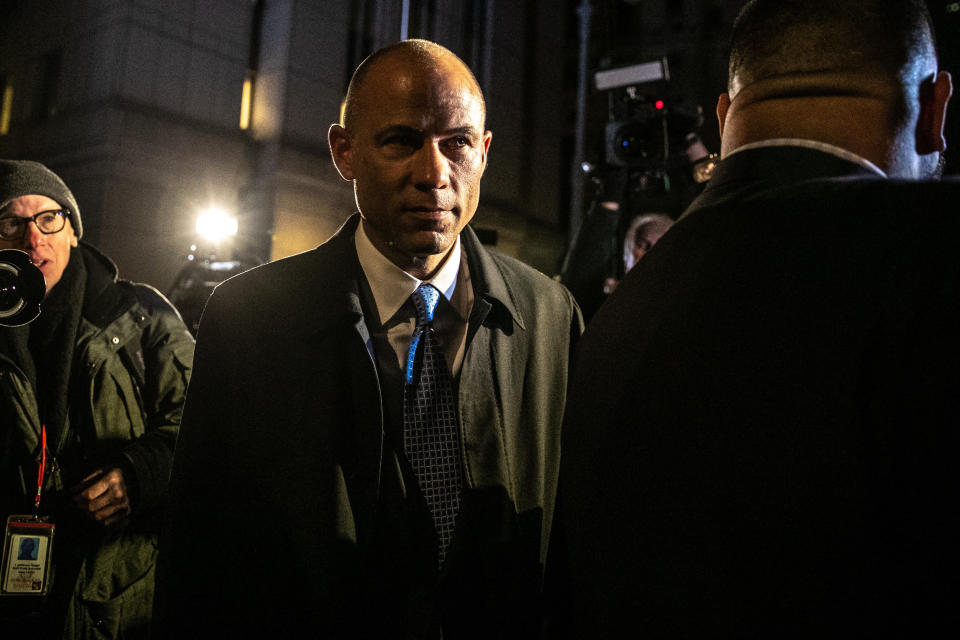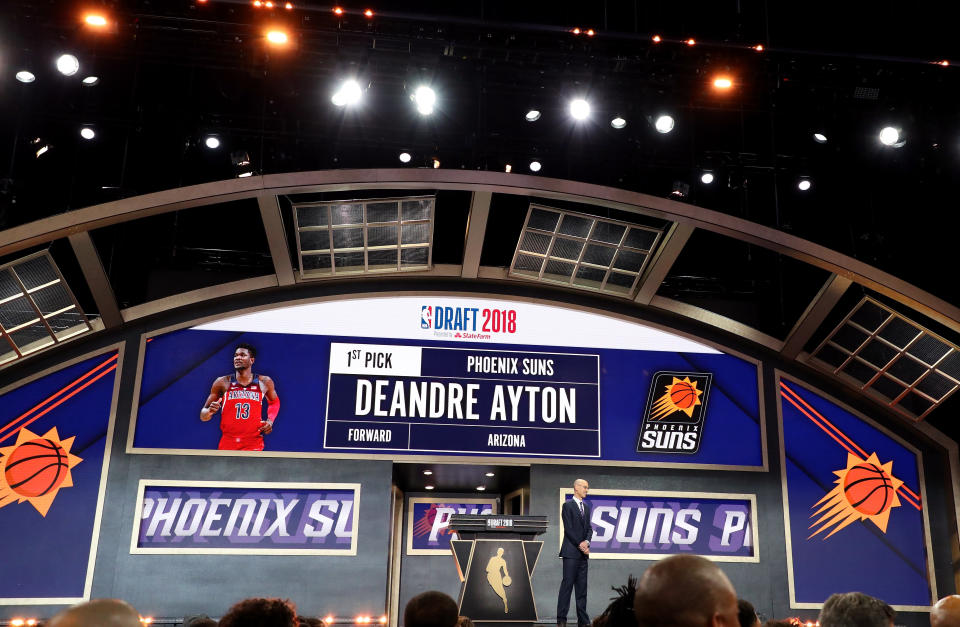Why Nike officials should be nervous after Avenatti allegations

The other shoe has dropped in the federal college basketball scandal. And it contains a swoosh.
Tweets from alleged felon Michael Avenatti, who is accused of extorting Nike, have rocked the sport for the past 36 hours. The accusations cast a shadow over Nike, two of its flagship basketball programs – Arizona and Oregon – and have left everyone wondering what else the high-profile attorney may say next.
Avenatti, the lawyer famous for representing adult movies actress Stormy Daniels, threatened via Twitter on Monday to hold a news conference to disclose “criminal conduct” in high school and college basketball “perpetrated by Nike.” Within an hour of the initial tweet on Monday, news broke that Avenatti had been arrested and indicted for attempting to extort nearly $20 million from Nike. (He was released on $300,000 bond on Monday night.)
Yet Avenatti isn’t backing down. He followed up Tuesday morning with tweets that contain allegations against No. 1 NBA draft pick Deandre Ayton, who attended Arizona last season, potential 2019 lottery pick Bol Bol of Oregon and a high-ranking Nike grassroots official.
Avenatti’s indictment originated from the Southern District of New York, which should be familiar to college basketball fans. That office took the lead on the landmark cases that resulted in the arrests of 10 men in September of 2017 and the convictions of three last October, in a trial that centered on Adidas' role in paying star basketball recruits. There are two federal trials scheduled from that investigation.
While Avenatti is accused of extorting Nike, legal experts say that doesn’t make his information any less interest to the SDNY — and, by extension, the NCAA. It was notable that Edward Diskant, the lead prosecutor on the Adidas case, stood alongside U.S. attorney Geoffrey Berman at his news conference announcing Avenatti’s arrest.

Is it Nike’s turn under the microscope?
With Avenatti’s accusations sending a jolt through the sport for the second consecutive day, an obvious legal question lingers in college basketball: Is it Nike’s turn next?
SDNY spokesman Nicholas Biase reiterated to Yahoo Sports on Monday night that “the investigation continues,” echoing the comments of Berman earlier in the day.
Stephen L. Hill, a partner at Denton’s in Kansas City and former federal prosecutor, summed up the next steps in the Nike case this way: “The Southern District of New York has demonstrated that it considers addressing corruption in amateur basketball, including college basketball, a priority. It’s fair to assume that if Avenatti or anyone else had information about inappropriate conduct in this space, that they would at least listen. There should be no confusion whether they condone the approach he took, because it’s clear on its face they don’t. However, I think given their enormous presence in college basketball they’d at least have to listen to what he’d have to say.”
Avenatti’s arrest doesn’t necessarily minimize the information he threatened to bring forward. His defense is clearly going to be that he’s a truth teller, which could end up putting pressure on SDNY to take a longer look at Nike after spending so much time investigating Adidas. Around the sport, coaches have long joked that Adidas and its infamous “Black Opps” grassroots division wasn’t bidding against itself for star players. (Adidas officials discussed keeping the Black Opps team presence secret on company email, which arose in the first trial.)
Could another federal colonoscopy be coming for the sport?
Where would an investigation start?
Avenatti’s tweets on Tuesday morning narrowed down where the feds should start looking by calling out two of the star players from the Nike-sponsored California Supreme basketball program. That program is coached by Gary Franklin, who Yahoo Sources identified as the disgruntled AAU coach who appears in court documents allegedly attempting to conspire with Avenatti to shake down Nike. (Federal documents cite an unnamed coach who was no longer receiving his $72,000 annually from Nike to run his program, which fits Franklin.)
The 7-foot Ayton played for Franklin's California Supreme team in the summer of 2016, was ranked the No. 3 senior in the nation by Rivals.com in 2017 and became a one-and-done star at Arizona. The 7-foot-2 Bol, played for Franklin in the summer of 2017, was the No. 4 senior according Rivals and went to Oregon. He suffered a foot injury nine games into the season and is not playing for a Ducks team that has advanced to the Sweet 16 of the NCAA tournament. Bol has already declared his intention to leave Oregon for the NBA. (He announced this in January through his attorney, Bryan J. Freedman.)
Avenatti first accused Ayton and his mother, Andrea, of taking “cash payments” from Nike, which would likely be illegal under NCAA rules and could also have greater legal implications. He accused Bol “and his handlers” of taking “large sums” of money from Nike. “The receipts are clear as day,” Avenatti said in a tweet. “A lot of people at Nike will have to account for their criminal conduct.”
Arizona and Nike did not respond for comment.
“We are unaware of any evidence that would support these allegations,” said Molly Blancett, spokesperson for Oregon. “Diligent inquiry last summer into the amateur status of our student-athletes revealed no indication of improper payments made to any student-athletes or their families.”
Avenatti went on to directly implicate a low-profile but important figure from Nike’s Elite Youth Basketball League, Carlton DeBose, who is the EYBL’s director. DeBose is essentially in charge of all things grassroots for Nike, one of the most important jobs in all of youth basketball. He controlled the budgets of teams, including having a say in financial decisions like ending Franklin’s contract.
“He’s the man behind the curtain,” said a veteran Nike grassroots source.
DeBose was the EYBL successor to Merl Code, who went on to work for Adidas and was found guilty in the first federal basketball trial. Code faces more charges in April.
Avenatti wrote on Twitter on Tuesday morning that DeBose was involved in Bol’s recruiting to Nike flagship Oregon. “A lot of people at Nike will have to account for their criminal conduct, starting with Carlton DeBose & moving higher up.”
He later added: “The corruption at Nike was rampant with Merl Code and increased with his apprentice DeBose after Code left for Adiddas [sic]. Those above DeBose knew all about the payments. Nike conspired to route many of the payments through a convicted felon. Nike then lied to the government.”
Code’s attorney declined comment to Yahoo Sports Tuesday.
Hill, the independent attorney, summed up the expected federal response to Avenatti’s allegations: “The U.S. Attorney’s Office in New York indicated last year the investigation was ongoing. Given that, they have to look at any credible information of illegal conduct regardless of its source. That is the nature of federal law enforcement.”

The AAU underworld
The Monday news brought Franklin, a low-key Southern California AAU fixture for more than a decade, into the spotlight. His program produced dozens of high-major players who attended schools like Arizona, USC and Oregon. In Monday’s news conference, Berman declined comment when asked if Franklin cooperated with the FBI.
“He was a major player in Southern California,” said longtime former sneaker executive Sonny Vaccaro of Franklin. “I remember him being very successful. His teams were competitive and his teams got to the level in Los Angeles proper.”
The first flurry of scandal in this college basketball case primarily involved Adidas, as players like Brian Bowen, Dennis Smith Jr., Silvio De Sousa and Billy Preston all ended up committing to schools sponsored by that shoe company – Louisville, North Carolina State and Kansas. Two former Adidas officials – executive Jim Gatto and consultant Code – were found guilty in the first trial.
There were hints that Adidas wasn’t bidding against itself for players in the first trial. There was a reference to former Adidas consultant T.J. Gassnola helping De Sousa “get out from under” a deal with a booster from Under Armour-backed Maryland, essentially needing to give him money to pay the booster back. There was also a mention in court that Oregon offered an “astronomical” amount of money for Bowen. Without more proof, there appeared to be little interest in federal officials chasing down the facts.
Will there be more motivation now? In the federal complaint, it states that Avenatti told Nike officials that “one or more Nike employees had authorized and funded payments to the families of top high school basketball players and/or their families and attempted to conceal those payments.” Avenatti’s tweets indicate those are Bol and Ayton, talented big men whose recruitments were fraught with complications and controversy.
A rotating cast of high schools, middlemen and agent runners followed them as they hopscotched to different schools in different states while playing for various grassroots teams. Ultimately, they ended up with Franklin’s Nike-sponsored AAU program and attending Nike-sponsored colleges.
Bol attended high school in the Kansas City area before transferring to Southern California power Mater Dei in 2016. His stay at Mater Dei lasted nearly a year. Bol attended USA Basketball minicamp in October of 2017 accompanied by Mel McDonald, a basketball underworld figure who’d also been tied to Ayton’s inner circle early in his high school career. McDonald wore Mater Dei warm-ups while he watched Bol at USA Basketball practice. A few weeks later, the son of late NBA star Manute Bol left for Findlay Prep, a Vegas-area basketball power. He committed to Oregon less than two weeks after that.
McDonald comes with a troubled past. He pleaded guilty to a misdemeanor extortion charge in 2013, which included 36 months of summary probation and 120 days in custody via a work release program. He has fulfilled the terms of his probation, leading a judge to grant a motion to dismiss in 2016. That case stems of allegations of extortion and theft.
Ayton came over from the Bahamas early in high school and became the top draft pick despite a sordid trip through the American basketball system. Yahoo Sports documented that journey last spring, including McDonald’s involvement.
Among those who paid to attempt to get close to Ayton were Gassnola, the former Adidas consultant, who testified in federal court last fall that he gave $15,000 to a friend of the family when Ayton was a high school junior. (McDonald was also involved in Ayton at one point during high school.)
What does Franklin know about the recruitments of Ayton and Bol? Likely a lot. “I think he’d have known those kids well enough to know what was happening,” Vaccaro said. “They’d have shared it, or he would have been involved. He’d have known. Those people would have trusted him.”
Information about Nike's potential role in those recruitments could arise in discovery, or potentially in a trial, which means another threat to the college establishment looms. “Anyone that participated in the conduct should be concerned that there’s going to be a knock on their door to flesh out the conspiracy,” Hill said.
On Monday, dozens of cameras lined up outside the Daniel P. Moynihan Courthouse in Manhattan for an unusual collision of the mainstream news and the sports world. Avenatti, a constant presence on the American cable news landscape over the past year, has now entered the American sports landscape with an infamous flourish.
What will that mean for Nike? In the third major federal case to emerge on the college athletics landscape in the past 18 months, that looms as the largest question.
More from Yahoo Sports:


